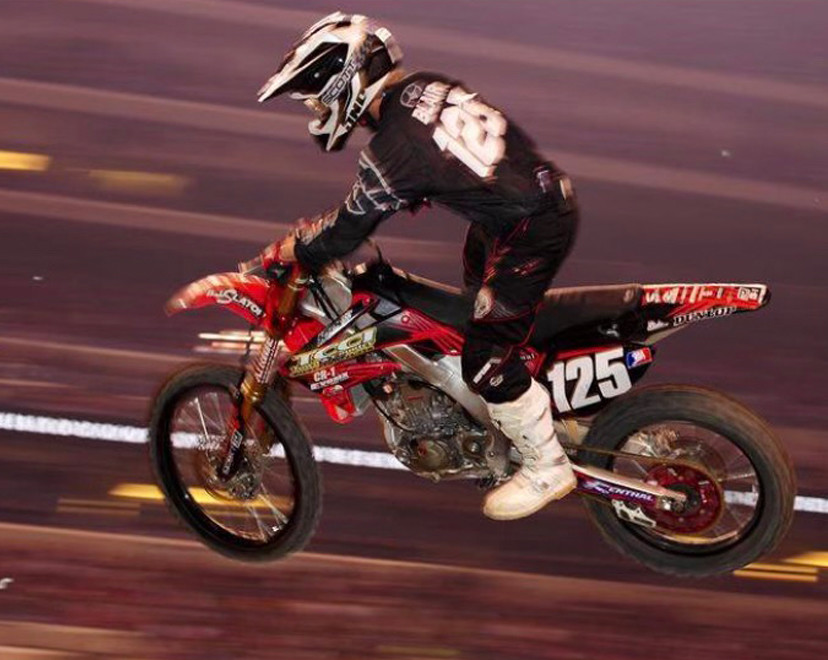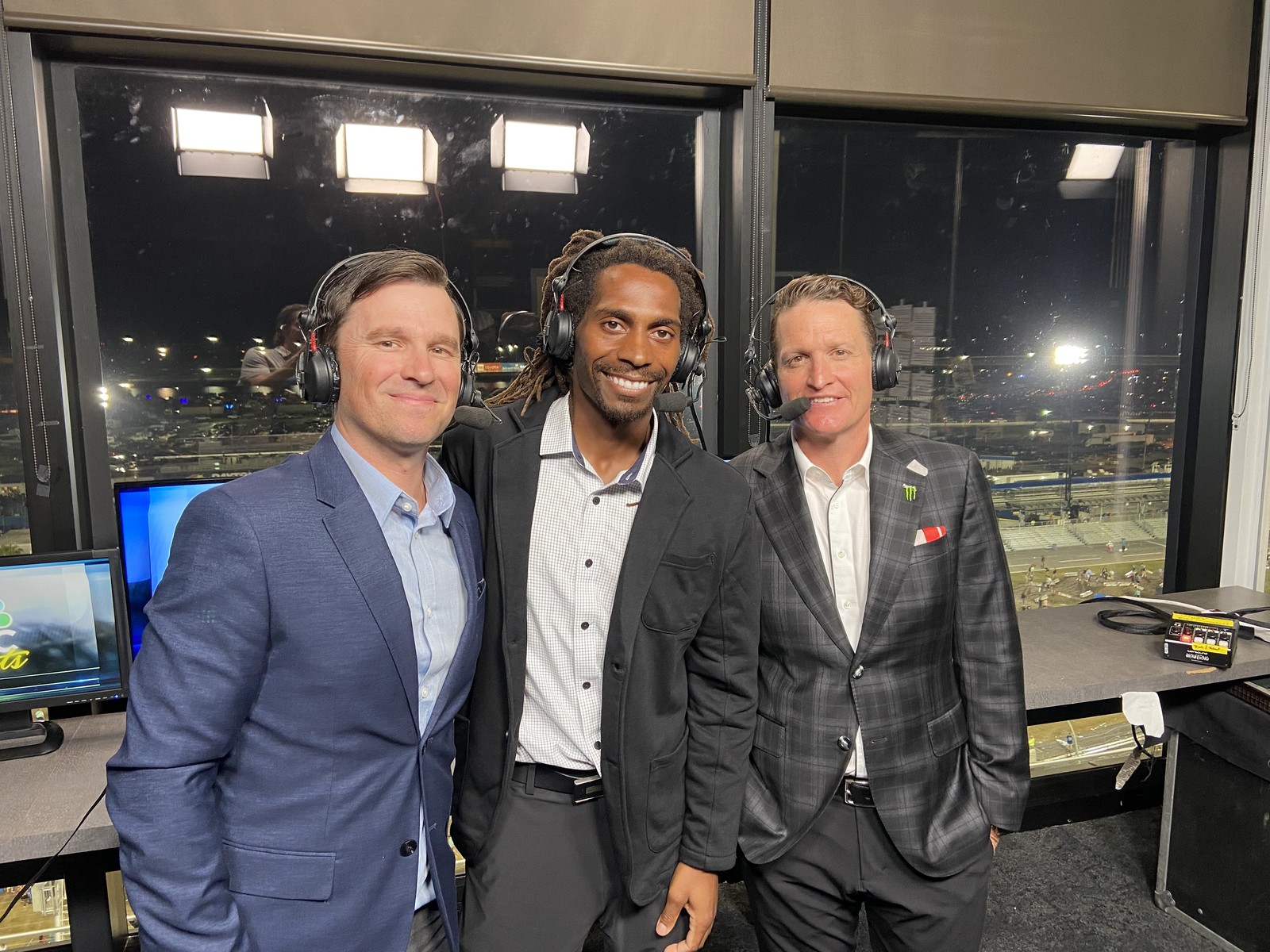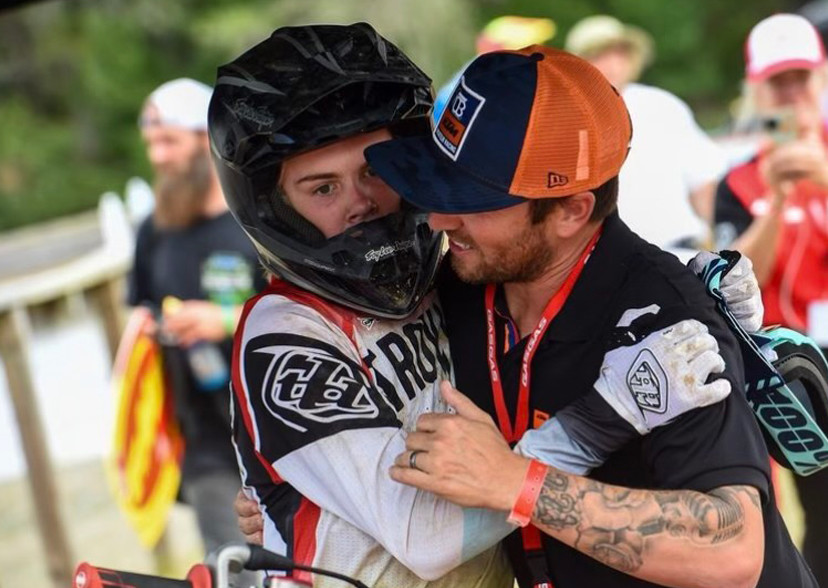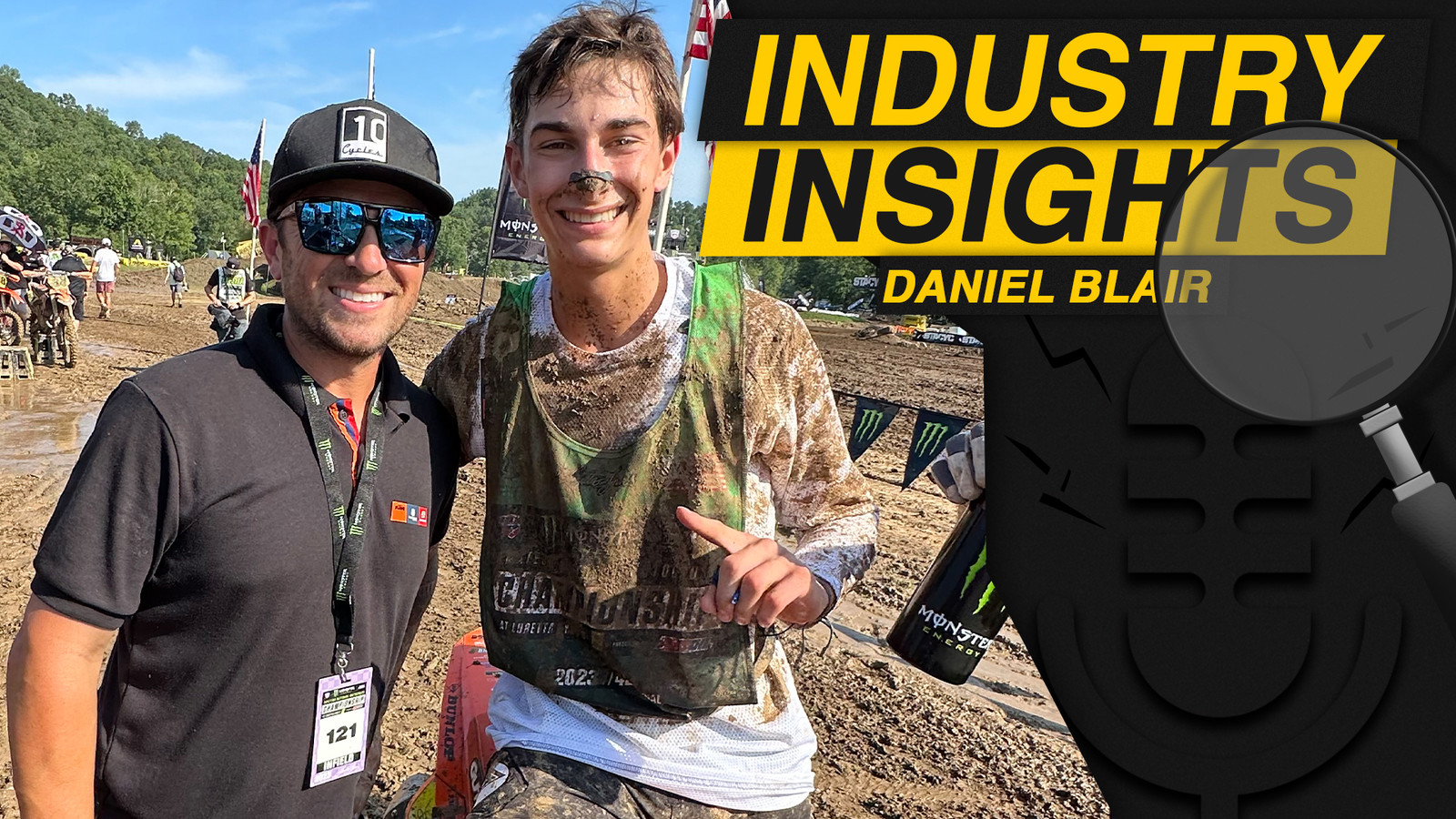In this installment of Industry Insights we talk to Orange Brigade Team Manager Daniel Blair. DB was a professional racer, hosts his own podcast, sings in a band, commentated for Arenacross and Supercross, and now works with up and coming riders. He's one of my favorite people in the industry and this one was a lot of fun. Enjoy.
For the full interview, check out the Vital MX podcast right here. There's a lot more conversation in the audio version, btw. If you're interested in the condensed written version, scroll down just a bit further.
Jamie Guida – Vital MX: What's up, DB?
Daniel Blair: What's happening? It was good to see you this last week.
Vital MX: You've done a lot within the motocross industry, and there is a lot to get into. First, for those who don't know, where did you grow up, and how did you get into moto?
DB: I've been a Northern California guy for my whole life. I spent a chapter of my life in SoCal (Southern California), and now I'm on the East Coast, but NorCal is home, anywhere between Hangtown in the Sacramento area and the Bay area, where I was born. I was born in Berkley, California. That was my stomping ground through amateurs and my pro career. I got into racing from my dad. I have a racing background in my family. My grandpa, Butch Blair, was a top-fuel drag racer. He was a racer, and then my dad was a racer. My mom and dad had me when they were super young, and he turned it on to me. They bought me a bike when I was born. It was a PW50 that just sat in my room until I was big enough to ride it. I crawled all over that thing, and then my parents decided my first race would be the World Minis in Vegas. So, that was my first actual gate drop ever. From there, it was off to the races, as they say.

Vital MX: Were you immediately into it?
DB: It was a natural obsession because it was in my room, my dad did it, and it was a dirt bike. Anyone who rides a dirt bike becomes obsessed 99% of the time, and they do it forever. Although, I don't feel I became obsessed and in love with the sport until I turned seven and raced Supercross in what would now be the KTM Juniors at Anaheim. I rode a PW50 and won the race. It was something like 50,000 people screaming; I was on the floor and getting interviewed, and from that point on, it was psycho obsession. After every race, my dad would call some hotline to get the results, and I would sit there and wait. I've been psycho-obsessed since seven, and here I am now doing this interview with you, and it hasn't let up.
Vital MX: When your younger brother, Vincent, comes along, did it add to your interest in riding? Did it make it that much better and fuel the competition even more?
DB: Not until we were on big bikes, and he turned pro. We started racing fairground races, and he started taking my money. Then things got a little weird, but before that, he was my little bro. He's almost five years younger, and I always felt more of a protector than a big brother. I always looked out for and cared for him because he was much younger. In my younger years, having someone to ride with was cool. In the later years, when he turned pro, it got complicated. He raced the Supercross series as a minor, and I had to take him. My family couldn't attend them all, so I took my 17-year-old brother on the road. We traveled the Supercross series together, and I was his guardian. Other than a few fairground races where I had to remind him, it was pretty solid.

Vital MX: When you reflect on your pro-Supercross career, what is your highlight?
DB: Wow, ok. I would say my highlight is a weird one, and if you look at the results sheet, it was pathetic how I ended the race, but I did set an AMA record. That's probably the highlight. In 2002, you could still ride both classes on the same night. That was during the transition from two-stroke to four-stroke, and not everyone had that yet. I was the first rider to make both main events on the same night on a four-stroke. It was Anaheim 3 in 2002, and the cool part doesn't involve me. It involves Matt Walker. He tried to pass me in the last corner of the LCQ and T-boned me. He bent my shift lever down and into first gear. I went over the finish line jump wide-open in first gear, cased the crap out of it, and made the main. He didn't make it. He was on Pro Circuit Kawasaki and missed the main. That was kind of cool at the moment, but what happened next was he won the next round of the series in Houston. So, he had a rough night and found his way into the LCQ, but he couldn't get by me. I barely squeaked by but had already made the Main on the 450 through the Semi. It was a cool chance to get in the record book.
Vital MX: You've made jokes about your Supercross career not being the greatest of all time, but you got to ride for a factory-level team with Geico Honda as a fill-in rider in 2009. For most privateers, that would be the dream, but it wasn't your best experience. Explain how it went down and what happened.
DB: I was five years removed from the worst injury I'd ever had, where I shattered both my heels in '04. I spent a couple of years unable to do it at all. I couldn't ride or train, and my results were terrible. That's when I started the band because I was unable to do what I loved. I had to do something, and it fell into place. Then, in 2008, my feet started to improve, so I could run and ride two days in a row. It really took that long. Then, in 2009, I came in prepared, threw everything at it, and it was the hardest I'd ever worked. I started the season with a top ten and then had a bad race in Atlanta where I didn't make the Main. I got burned badly by a red flag. That's a story for another day. In the next round in Indianapolis, I got seventh with a great ride, and I emailed the Geico Honda team, asking them for a shot, or even parts or anything to keep me on the road. I got a callback, and they said, "We'll fly you to California and give you a tryout." I did the tryout, and it was against Steve Boniface, who was from France and better than me if we're being honest, but they called and gave me the ride. It was a short-lived experience that you would think was the opportunity of a lifetime. In reality, I learned if you don't come in prepared and gelling with your motorcycle, there's not much you can do out there, no matter how badly you want it. Getting on a factory bike may sound amazing, but it's counterproductive if it's not yours and set up for you. I was slower on that bike, and my results were worse. It never felt right, but the suspension was not for me. We tried to make it for me, but we had five weeks to figure it out and didn't. On the results sheet, you'll see ninth overall in the championship, which I'm proud of, but in reality, I was better than that. As cool as the factory ride was, it was essentially my death blow. After you have your shot and don't do enough with it, nobody is going to give you another one at 26 years old. So, one of the coolest experiences ever turned into one of the worst of my career. I was bummed, but it was the reality, and it's helping with my career now, navigating the amateur racers careers who are jumping on trick bikes sooner than they used to. I navigate suspension with my riders every day, and without the experience I had riding for Geico and knowing what I went through, I wouldn't be able to help them.

Vital MX: I believe you're a guy who has had a lot of success in the industry and learned lessons from each of your experiences that you can use for your next endeavors.
DB: 100%. Not just the lessons but also the work ethic. I have many regrets from my racing career, where if I'd worked harder, I could have gotten more opportunities. I didn't work hard enough or take it as seriously as I needed to. That regret is why I'm more successful now that I'm older. I don't take things for granted. I know it takes hard work, and my racing career is my biggest fuel because I didn't take opportunities properly.
Vital MX: You commented that the Geico opportunity was the death blow to your career, but you eventually transitioned into Arenacross, where you won a regional championship. You joked that you were an old guy beating up on the kids, but I think it's something to be proud of.
DB: In truth, I am. I have the number one plate on my wall for a reason. If I was all the way embarrassed, I wouldn't do that. I am proud and can show my son, "Look what I could accomplish later in life by being driven. You can accomplish things anytime in your life. Even when you're older." I think it's a good message. I transitioned to Arenacross because I still wanted to race, and I loved it, but Supercross was getting scary. I didn't want to take those risks anymore. So, I went to Arenacross, where I could be competitive and stay motivated but not be at such risk. That led me to settle in and get to know everybody there, like the promoters at Feld, including Mike Muye and Bill Harris, who are still there today. That led to the next chapter of my life: the TV career. If I hadn't been in Arenacross, I would have never been considered to audition for that role. I wouldn't have been there to do the track reports and press day interviews I was willing to do just because I loved it and wanted my sponsors to get more attention.

Vital MX: That eventually led to an opportunity to do TV for Supercross. You did track-side reporting and Race Day Live and made it into the booth for the big show. I feel that must have been a dream come true to some extent.
DB: Yeah. It happened kind of fast. It didn't feel that way at the time, but it did happen fast. I started in 2017, and by the end of that season, I got to do one on the floor, which was kind of random. They said, "Hey, you're doing well on Race Day Live, so we'll throw you on the floor." In 2018, I did ten, and then in '19, it was all of them. It all spiraled fast, and the next thing you know, I was sitting in the booth in Salt Lake City calling the race for the first time. I'd never done that. I'd done the Arenacross position, but that was all voice-over. That was my first live, in-the-moment play-by-play ever. It was from hard work and opportunities coming at the right time.
Vital MX: In 2022, you got another unexpected opportunity just before the Loretta Lynn Amateur Nationals. You started working with KTM and Orange Brigade. That turned into you being the Orange Brigade Team Manager. How did that come to be?
DB: I attended the Orange Brigade camp to help coach and with media training. The next thing you know, I'm driving to Loretta Lynn's in a rental car and signing my DocuSign with KTM to become an employee. I showed up with a piece of paper with all the names, ages, and classes. I'd met some of them at the camp but didn't know them all. I treated that the same as everything I do by a relentless pursuit of being the best I can be. This one feels different because it's not about me. If I succeed in this job, then other people will succeed. This is more of a giving pursuit in hopes that they can all be successful and become factory riders with wins and championships.
Vital MX: Let's close this out with some non-moto topics. You started a band years ago with your brother called Main Event. You sing, and your brother plays all the other instruments on the albums. Tell us how the band started.
DB: My brother was injured when he was 15 with a broken leg, and he didn't know what to do with his life sitting there recovering. My dad had a guitar and amp, and Vincent decided to learn to play. He would listen to the radio and follow along. I came out in the garage once, and he was playing something, and I asked, "What is that?" He said, "I wrote it." My brother is a psycho. Anything he puts his mind to, he'll master in a year. A year or two later, we're living in Southern California, and I'm recovering from my injury in Vegas. Vincent said, "We should start a band." So, we did. All of a sudden, it started going fast. We got an EP out and released it. We started touring, did the Warped Tour, and went to Europe twice, and it was boom, boom, boom. The problem was I never really 'loved' it. Racing was my love. Music was a passion as a fan, but not me wanting to be a musician. I was also married, and the environment didn't fit. So, it didn't last.

Vital MX: The last thing I want to ask about is your kids, Evan and Elaina. Evan is racing a lot and has started his youth gear company, Stay Young. Elaina is competing in dance and gymnastics, I believe. Talk about all your kids are accomplishing.
DB: Ooff. What a week. I went to my daughter's gymnastics tournament this weekend, and she's little. She just got started, and she's the sweetest little girl ever. I can't believe how competitive she is. I didn't even know she was this way. She got a third and fourth in different categories and was fifth overall. You should have seen her on the stage getting her awards. It was the most sour, unhappy expression, and we didn't know what was wrong. She wouldn't talk to us, so we thought something had happened. Later, I sat her down and asked what that was all about. She said, "I wanted to win." I didn't know she had that in her. She couldn't stand the fact that she didn't win. Then, I have my son, who, in the same week, I just bought a 125. He's on the big bike, and we'll share sprockets and bars. My 13-year-old is on a big bike now. To answer your question, life is super rad right now. I couldn't be happier, and I feel blessed.




View replies to: Industry Insights | Ft. Daniel Blair
Comments